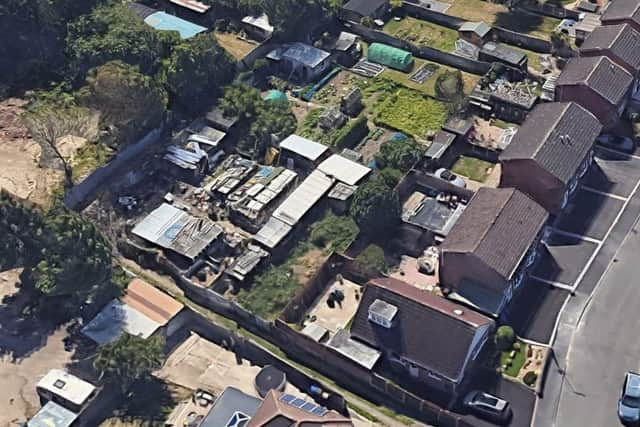"Battery farm shanty town empire” in a Derbyshire town is set to stay on allotment site
and live on Freeview channel 276
An allotment site off Andrew Avenue, in Ilkeston, was the subject of a tense Erewash Borough Council meeting in May and is now coming back for a final decision over its future.
Councillors had previously deferred a decision over the site to allow discussions over fencing which would be erected around the plot.
Advertisement
Hide AdAdvertisement
Hide AdNow, officials are recommending approval of the part-retrospective plans for two aviaries and fencing, following discussions with neighbours and the site owners.


The site has been unlawfully used to house dozens of chickens for 20 years in “ramshackle” buildings, but due to lack of enforcement by the borough council it is immune to any action.
Earlier this year, a council meeting heard how the site had been causing widespread disturbance and dismay for residents nearby, including issues around noise, odour and pests.
Councillors and officials were clear that they would ideally like the site to have never been operating but found that planning laws dictate that, because enforcement action has never been taken, the business must now be allowed to continue.
Advertisement
Hide AdAdvertisement
Hide AdCouncil officials have now written, ahead of a meeting next week, that timber fencing to the rear of Number 72 Andrew Avenue would be erected to block the site from view.
This would create a fence of 2.2 metres in height for the neighbouring garden and 2.9 metres for the allotment side of the fencing.
Council officers say this would improve the situation, despite the site remaining visible from the neighbouring garden, saying it would not be “overbearing” with the addition of the fence.
Neighbours around the site dispute the acceptability of the fence and the perceived reduced impact of the site and say they would prefer a taller brick wall instead of a fence, officers write.
Advertisement
Hide AdAdvertisement
Hide AdCouncil officers write: “For the reasons given above the existing use and structures are considered to be acceptable due to their established planning status.
“The additional proposed structures would not exacerbate the issues raised by the lawful development, would not result in additional material harm to the amenity levels that nearby occupiers currently enjoy over and above the existing situation and indeed could result in some improvements.”
Mark Hill, aged 52, the site owner, had told the Local Democracy Reporting Service in May that were 40 chickens on the site – for meat and egg sales – along with six rabbits, for personal consumption, and a number of parrots and finches which are kept as pets, with show-bird sales now stopped.
He denied the allegations of nuisance noise, foul odours, poor pest control and anti-social behaviour including burning of waste – such as dead animals.
Advertisement
Hide AdAdvertisement
Hide AdMr Hill also denied that his collection of buildings, constructed out of breeze blocks and corrugated iron and periodically rebuilt, are a “shanty town” and aims to improve this through the buildings he has now applied for – and are part way through construction.
Steve Birkinshaw, the council’s head of planning, said any “material development” of a site becomes immune to enforcement after four or more years of consistent use without action being taken, and a change of a site’s use also becomes immune after 10 or more years of continuous use without intervention.
He said in the May council planning meeting: “Had this application come to us as a proposal to develop a small battery farm to the rear of several dwellings I would undoubtedly be recommending refusal, but regrettably that is not the situation we are in.
He said conditions could be attached to the new building plans in an effort to make the site less prone to causing issues, but this was effectively limited to installing further tall fences around the boundary with neighbouring homes, which he worried “would not make a great deal of difference”.